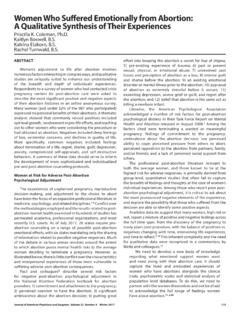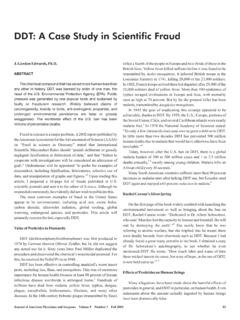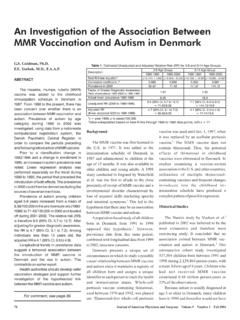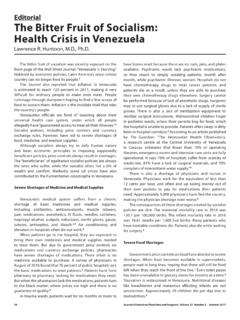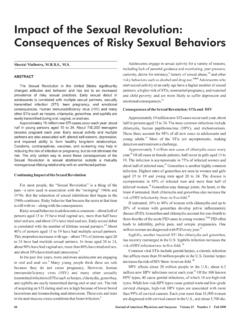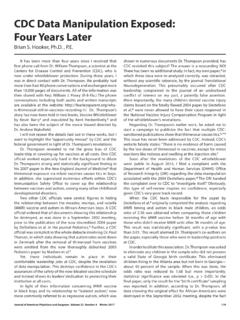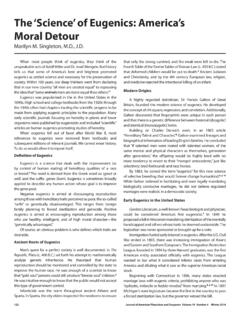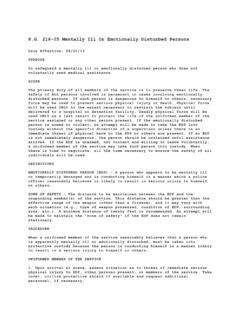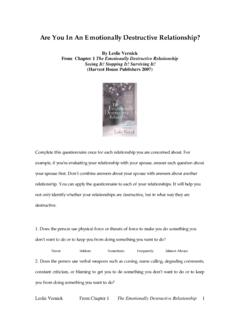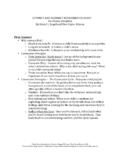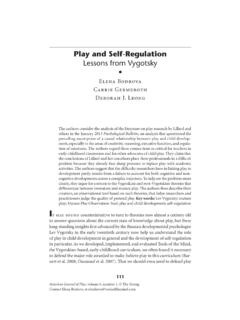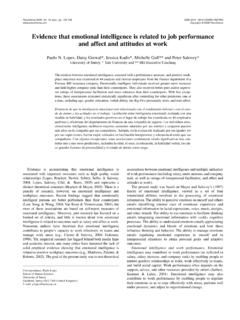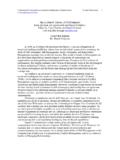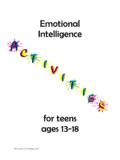Transcription of Women Who Suffered Emotionally from Abortion: A ...
1 Women Who Suffered Emotionally from Abortion: A Qualitative Synthesis of Their Experiences Priscilla K. Coleman, Kaitlyn Boswell, Katrina Etzkorn, Rachel Turnwald, ABSTRACT effort into keeping the abortion a secret for fear of stigma;. 5) pre-existing experience of trauma; 6) past or present Women 's adjustment to life after abortion involves sexual, physical, or emotional abuse; 7) unresolved past numerous factors interacting in complex ways, and qualitative losses and perception of abortion as a loss; 8) intense guilt studies are uniquely suited to enhance our understanding and shame before the abortion; 9) an existing emotional of the breadth and depth of individuals' experiences.
2 Disorder or mental illness prior to the abortion; 10) appraisal Respondents to a survey of Women who had contacted crisis of abortion as extremely stressful before it occurs; 11). pregnancy centers for post-abortion care were asked to expecting depression, severe grief or guilt, and regret after describe the most significant positive and negative aspects the abortion; and 12) belief that abortion is the same act as of their abortion histories in an online anonymous survey. killing a newborn infant. Many Women (just under 32% of the 987 who participated) Likewise, the American Psychological Association expressed no personal benefits of their abortions.
3 A thematic acknowledged a number of risk factors for post-abortion analysis showed that commonly voiced positives included psychological distress in their Task Force Report on Mental spiritual growth, involvement in pro-life efforts, and reaching Health and Abortion released in August Among the out to other Women who were considering the procedure or factors cited were terminating a wanted or meaningful had obtained an abortion. Negatives included deep feelings pregnancy; feelings of commitment to the pregnancy;. of loss, existential concerns, and declines in quality of life.
4 Ambivalence about the abortion decision; low perceived More specifically, common negatives included feelings ability to cope; perceived pressure from others to abort;. about termination of a life, regret, shame, guilt, depression, perceived opposition to the abortion from partners, family, anxiety, compromised self-appraisals, and self-destructive and/or friends; and a lack of perceived social support from behaviors. A summary of these data should serve to inform others. the development of more sophisticated and individualized The professional post-abortion literature relevant to pre-and post-abortion counseling protocols.
5 Both the average woman, and those known to be at the highest risk for adverse responses, is primarily derived from Women at Risk for Adverse Post-Abortion group-level, quantitative studies that often fail to capture Psychological Adjustment the breadth of feelings and thoughts at the core of Women 's The experiences of unplanned pregnancy, reproductive individual experiences. Among those who report poor post- decision-making, and adjustment to the choice to abort abortion psychological adjustment, it is critical to ask about have been the focus of an expansive professional literature in the most pronounced negative elements of the experience, medicine, psychology, and related Conflict over and explore the possibility that those who Suffered from the the methodologies employed and the results related to post- decision are able to identify some positive aspects.
6 Abortion mental health examined in hundreds of studies has Available data do suggest that many Women , high risk or permeated academia, professional organizations, and most not, report a mixture of positive and negative feelings across recently courts. As of July 2017, 20 states require pre- the full time span, from the discovery of the pregnancy to abortion counseling on a range of possible post-abortion many years post-procedure, with the balance of positives vs. emotional effects, with six states mandating only the sharing negatives changing with time, intervening life experiences, of information related to possible negative responses.
7 Much and time to This inherent complexity and the need of the debate in various arenas revolves around the extent for qualitative data were recognized in a commentary by to which abortion poses mental health risks to the average Weitz and woman deciding to terminate a pregnancy. However, as We need to develop a new body of knowledge illustrated below, there is little conflict over the characteristics regarding what emotional support Women want and interpersonal experiences of those most vulnerable to and need along with their abortion care. It should suffering adverse post-abortion consequences.
8 Capture the lived and embodied experiences of Paul and colleagues6 describe several risk factors Women who have abortions alongside the clinical for negative post-abortion psychological adjustment in trials, psychometric scales and statistical analysis of the National Abortion Federation textbook for abortion population level databases. To do this, we need to providers: 1) commitment and attachment to the pregnancy; partner with the Women themselves and not be afraid 2) perceived coercion to have the abortion; 3) significant to acknowledge the full range of feelings Women ambivalence about the abortion decision; 4) putting great have about , p 88.
9 Journal of American Physicians and Surgeons Volume 22 Number 4 Winter 2017 113. Significant insight about distinct emotional trajectories fully understand their experiences. This study is specifically has come from qualitative, albeit small-scale, investigations. a thematic analysis of responses from a large sample of Goodwin and Ogden8 conducted an interpretative participants (n=987) in a nationwide survey, wherein the phenomenological analysis based on transcripts of 10 Women described the most significant positive and negative interviews with Women who had experienced an abortion aspects of their abortion experiences.
10 No previous studies from 1 to 9 years prior. The authors observed that although of this size, using a qualitative methodology based on a few Women reported a linear pattern of change in their open-ended responses from Women , who have sought emotions, many described more variable patterns including post-abortion care from a crisis pregnancy center, have persistent negative emotions across many years, negative been conducted. Broad questions posed in a safe context reappraisal at some point post-abortion, and positive were expected to bring deeper understanding of the appraisal at the time of the abortion with no subsequent concerns and pains experienced by Women who were not negative emotions.
